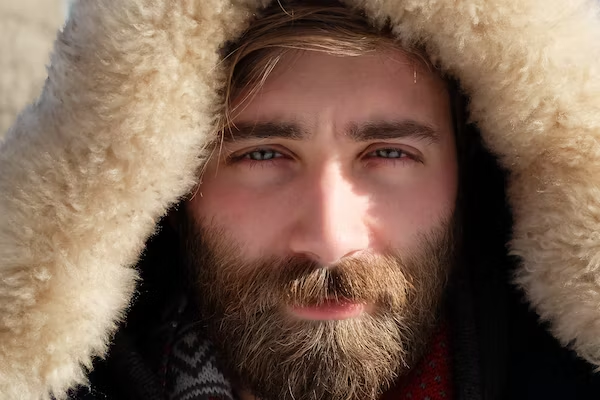
Looking to grow a bigger, better beard? While this is partly determined by genetics, you can provide the healthiest environment for hair growth to thicken existing hair, fill in patchy areas, and encourage more growth.
Vitamins and supplements can help with beard growth – and general hair growth – to support that thick, full beard you want.
What Influences Hair Growth?
Androgens, which are steroid hormones, influence beard growth. Healthy hormone levels are important for beard growth, including the appropriate levels of testosterone. High levels of testosterone and the conversion to dihydrotestosterone (DHT) play important roles in hair growth and overall health.
The sensitivity of the hair follicles to DHT is influenced by hormone levels and genetics, which is why baldness is hereditary. Hair follicles on the head, compared to the face, may respond differently to beard follicles, however. In studies, beard follicles may be more sensitive to DHT, but the exact role they play in growth is not known.
Low testosterone, or male hypogonadism, is a medical condition in which the testicles in men or the ovaries in women don’t function properly. Along with hair growth issues, low testosterone can also cause infertility, erectile dysfunction, the development of breast tissue in males, and decreased muscle mass. If you don’t have low testosterone, taking testosterone is unlikely to help with facial hair growth.
Genetics also plays a key role in baldness, hair growth, and beard growth. We can’t change our genes, but epigenetics – the environmental factors influencing genetic expression – may indicate that lifestyle factors like diet and exercise may affect how facial hair grows.
There’s limited evidence that some vitamins and supplements may affect hair loss, premature graying, and other changes. These include:
1. Vitamin A
Vitamin A, which is found in red bell peppers, leafy greens, and other foods, may trigger androgen activity. It’s also important for immune support, healthy vision, and reproductive health.
2. B Complex Vitamins
The B complex vitamins, which include B6, B3, and B12, may affect how the body metabolizes nutrients like protein, which is a key factor in building healthy skin and hair cells. B complex vitamins are found in meat, seafood, poultry, eggs, dairy, legumes, leafy greens, and some fortified foods.
3. Vitamin C
Vitamin C is a powerful antioxidant that can manage oxidative stress and contribute to hair aging. No studies have determined a correlation between beard growth and vitamin C, however, though it is established that vitamin C is important for healthy skin and collagen synthesis.
4. The body produces Vitamin D Vitamin D through exposure to the sun’s UVB rays. Vitamin D can activate hair follicles and produce new hair when other hair is lost. It’s also important for people with low testosterone to naturally increase testosterone levels.
5. Vitamin E
Used topically, vitamin E helps with blood flow and circulation at the skin level. Hair follicles are more nourished, potentially contributing to healthier growth.
6. Horsetail Extract
Horsetail extract is an herb rich in minerals like silica. Research suggests that silica can potentially reduce hair loss and may have antioxidant properties that can protect the health of hair follicles.
7. Biotin
Biotin is promoted as a hair growth supplement because of the role that biotin plays in skin, hair, eye, liver, and nervous system health, though there’s no research to show a link between biotin supplementation and facial hair growth. Biotin is naturally found in beef liver, eggs, milk, oats, almonds, and spinach.
8. Zinc
There’s a correlation between normal testosterone levels and high zinc levels. This mineral is found in oysters, red meat, nuts, and dairy. Studies show that zinc can moderate serum testosterone levels in adults.
9. Copper
Copper is an essential mineral only needed in trace amounts. Studies show that copper can promote dermal papilla cells, which manage hair growth and regeneration and may stimulate the proliferation of dermal fibroblasts.
Lifestyle Tips for Hair Growth
If you’re struggling to grow a beard, you can make some lifestyle changes to encourage healthy hair growth:
- Reduce stress levels: While there’s no simple answer, hair loss can occur because of excessive stress.
- Eat a healthy diet: A balanced diet will provide all the nutrients the body needs to promote hair growth.
- Get plenty of rest: Better sleep means better health, influencing hair health.
- Stop smoking: Smoking can lead to hair loss in some people, as well as a host of other health problems.
- Take care of your skin: Keeping up a good skincare routine keeps your skin – including the skin around your hair follicles – healthy.
Consider Facial Hair Transplants
If supplements and lifestyle changes aren’t helping your beard growth, facial hair transplants are an option. Typically done using follicular unit extraction (FUE), a facial hair transplant is a surgical procedure that can be performed on the beard, mustache, sideburns, and cheeks to produce a full, thick beard.
With FUE, hair follicles are taken from an area of the scalp with dense growth and transplanted to the beard area. The procedure is painless and takes just a few hours with local anesthesia, giving you the full beard you want.
Facial Hair Transplant at Hair Restoration NYC
If you’re considering a facial hair transplant, the capable and compassionate team at Hair Restoration NYC can help! We’ll be happy to meet with you to discuss our hair transplant options in New York, including FUE for facial hair. Contact us today to schedule your consultation!